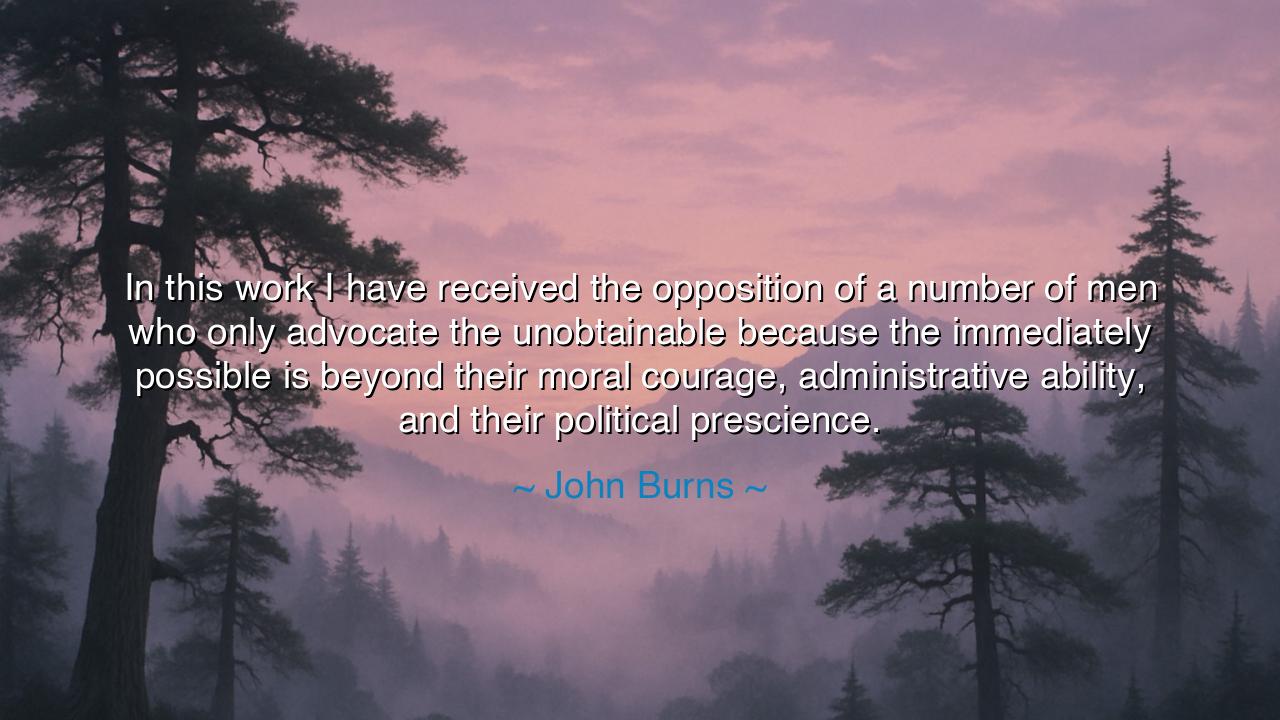
In this work I have received the opposition of a number of men
In this work I have received the opposition of a number of men who only advocate the unobtainable because the immediately possible is beyond their moral courage, administrative ability, and their political prescience.






“In this work I have received the opposition of a number of men who only advocate the unobtainable because the immediately possible is beyond their moral courage, administrative ability, and their political prescience.” – John Burns
In this sharp and noble declaration, John Burns, the British reformer and labor leader, unveils a truth that pierces through all ages: that many who clamor for the impossible do so not from vision, but from cowardice. His words are not a cry of bitterness, but of clarity. He had seen with his own eyes that some men shout for ideals they cannot build — they cry for paradise, yet cannot lift a single stone toward it. For them, the immediately possible, the small, hard step that must be taken now, is too heavy. So, cloaked in lofty dreams, they hide their lack of moral courage, their want of ability, and their blindness to what the times require.
To advocate the unobtainable is easy. It wins applause, for it asks nothing but words. The man who demands the possible, however — who works with soil and sweat and error — invites mockery. The dreamers who fear to act will always scorn the builder who dares to begin. Burns himself was such a builder. Born in poverty, he rose to become a voice for the workers, not through speeches of fantasy, but through practical reform — better housing, fairer wages, cleaner cities. His battles were not fought in the clouds but in the streets. And so, he was opposed not by tyrants alone, but by those too timid to dirty their hands in real labor for justice.
This struggle between the ideal and the attainable has raged since the dawn of civilization. Recall the tale of Moses — who, after leading his people from slavery, did not promise them instant freedom or endless abundance. He offered them a journey, long and painful, through the wilderness. Yet many among them complained, desiring miracles without effort, victory without discipline. Such is the nature of men: to demand what cannot be done when what can be done requires their courage. Burns’ wisdom reminds us that to achieve the possible is itself divine work; for the possible, done faithfully, builds the foundation upon which the impossible may one day stand.
There is moral cowardice in inaction disguised as purity. Some speak only of the “perfect world,” because they lack the strength to mend the imperfect one before them. Others preach about ideals while refusing to take a single step that might offend comfort or invite ridicule. These are not visionaries, but fugitives — fleeing from responsibility under the banner of idealism. Burns saw through them, as every true reformer must. He knew that change begins not with dreams, but with deeds, not with unreachable utopias, but with courageous, flawed human effort.
The truly wise do not reject the dream — they tether it to the earth. They labor each day to make the immediately possible real, for they know that progress is born from patience and perseverance. To demand all at once is to achieve nothing. To demand one thing now, and achieve it, is to set the world in motion. History bears witness to this truth. When Florence Nightingale reformed the horrors of battlefield hospitals, she did not abolish all suffering — she reduced it. When Nelson Mandela sought reconciliation, he did not destroy all injustice — he planted the seed of peace. These were not men and women of fantasy, but of courage. They faced the attainable and made it noble.
Thus, let us not be deceived by those who speak too grandly but act too little. The unobtainable has its poets, but the possible has its heroes. To labor toward the possible is to possess faith — faith that small victories are the paving stones of eternity. The world does not move by the hands of those who merely wish, but by those who dare. Burns’ rebuke is not against dreams, but against hypocrisy — the kind that speaks of heaven yet fears to lift a finger for earth.
So, children of the future, learn this: do not despise humble beginnings, nor wait for the perfect hour. Be among those who act when others only argue. Have moral courage when the timid seek escape in talk of impossibility. Begin with the immediately possible — mend one wound, feed one soul, correct one wrong. For every stone so laid becomes part of the temple of a better world. And when at last that temple stands, it will be built not by those who spoke of dreams, but by those who had the strength to turn them, one by one, into reality.






AAdministratorAdministrator
Welcome, honored guests. Please leave a comment, we will respond soon